replanting agave
There’s a middle school in Zaachila…
There’s a middle school in the Oaxacan community of Zaachila that is located atop the city’s dump site. The students there are learning to grow agave from seed. SACRED is underwriting the program by purchasing 10,000 of the plants each year, and gifting those plants to mezcaleros and agave farmers in need of plants.
The community of Zaachila, some 25 minutes south of Oaxaca Centro, includes the city’s only sanctioned garbage dump. That dump is full of recyclables, which can be collected and turned in for money. People have been diving into the garbage to do just that since the 1970s, and at some point, they began building lean-tos and other improvised shelters on that same land — squatting — to be closer to their funding source.
That community is now some 12,000 - 15,000 people. And because they are squatting, they don’t receive the same level of government support that other communities receive. One consequence is that a middle school — Telesecundaria El Manantial — ran out of water mid-year, back in 2017.
The teacher of the agricultural class solved this problem by changing the curriculum to focus on a plant that doesn’t require a lot of water: agave. He comes from a family of agave farmers in the Mixteca region, so accessing seeds was as simple as visiting his home.
After the first crop of seedlings was harvested and replanted into individual bags with soil, the school contacted SiKanda, a Oaxacan nonprofit that supports projects in Zaachila and other communities populated by these informal recyclers. SiKanda — who had already received some small grants from SACRED — contacted us to see if we had any interest in the plants.
Of the thirty or so agave varietals that are commonly used to make heritage agave spirits, Tobala (agave potatorum) is highly prized. The plants can take eight to 12 years to reach maturity in the wild, so they are less commonly farmed than a variety like Espadin, which can be harvested after six years, in some communities.
SACRED purchased a couple thousand plants from that original crop (note 1 and note 2), gifting them to mezcaleros with whom we’re friendly. But then we also made a commitment to support the continuation of the program for three years, beginning with the 2018-2019 school year.
Tobala seedlings generally cost between US 35¢ and 50¢ each, and that price doesn’t cover the costs incurred by the school. So our commitment was to purchase each year for three years between 4,000 and 10,000 at a price of one US dollar each.
We fulfilled that three-year commitment at the end of the 2020-2021 school year, having purchased and distributed over 32,000 seedlings. As we were nearing the end of that three years, Profesora Xochitl, who runs the school, sent us a picture of a ground-breaking. The money they’d earned selling us seedlings was being used to build a library — and it was being built on land that was given to the school by the same government that had cut off their water supply, which started the whole program.
We knew going into this that we were helping families who are having a hard time accessing agaves, as a result of the worldwide interest in Oaxacan mezcal. But we never imagined we would also help build a library and mend a divide between a squatter community and the local government. So while our agreement with the school ended in 2021, we’ve continued to purchase seedlings from them annually to keep this program strong and to continue to support the families who have carried the torch for heritage agave spirits for hundreds of years.
As of 2025, we’ve distributed more than 95,000 seedlings through this program.
Some of the first Tobala babies purchased from Telesecundaria El Manantial, planted on the property of a maestro mezcalero in Miahuatlan, Oaxaca

